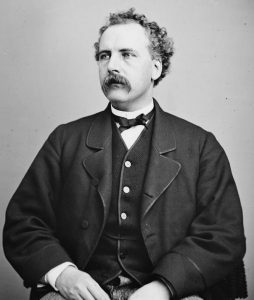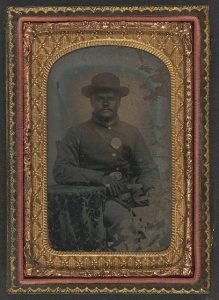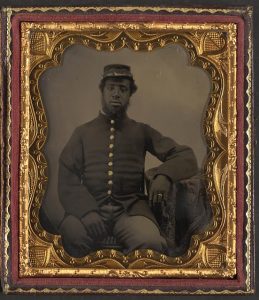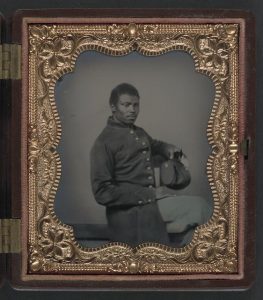“Freedom!” Their Battle-Cry: 1863 Poetry For African American Soldiers
 Poetry has many form and uses, and this writing form has legendarily been used to celebrate heroes. Some of the earliest epics in World History – Homer’s Iliad and Odyssey – were crafted in poetry form. Through meter, rhythm, and rhyme, the tales of warriors from many different eras appear.
Poetry has many form and uses, and this writing form has legendarily been used to celebrate heroes. Some of the earliest epics in World History – Homer’s Iliad and Odyssey – were crafted in poetry form. Through meter, rhythm, and rhyme, the tales of warriors from many different eras appear.
The American Civil War inspired a large amount of poetry, much of it still resting in newspapers, private journals, or volumes published shortly after the war. It echoed the long-standing themes of courage, warrior-spirit, lamentations, and memorial memory.
In May 1863 – just a few months after the Emancipation Proclamation allowed African Americans to formally enlisted in Union armies and navies – American poet and playwright George Henry Boker crafted a six stanza poem about the courage of the USCT and what their fight for freedom meant.

The Civil War changed George Henry Boker (b. 1823-d. 1890) and made him an active Union supporter with new ideas to put into poetry. Originally a Democrat, the conflict quickly forced him to change political sides, and Boker played a key role in establishing the strength of the Republican party in Philadelphia, Pennsylvania. He helped found the Union League Club, serving as its secretary from 1863-71 and then as its president from 1879-84. Inspired by the troops, the abolition movement, and the Union causes, Boker wrote patriotic poetry and many of his war poems were published in 1864 under the title Poems of War.
The enlistment of African American men to fight for the Union marked an important turning point in the Civil War and the fight for freedom. Like warriors of ancient times, these brave men found glory and ideals on the battlefield that became the subject of poetry to perpetuate the memory of their experience and deeds.
The Black Regiment
By George H. Boker, May 17, 1863.

Dark as the clouds of even,
Ranked in the western heaven,
Waiting the breath that lifts
All the dead mass, and drifts
Tempest and falling brand
Over a ruined land –
So still and orderly,
Arm to arm, knee to knee,
Waiting the great event,
Stands the black regiment.
Down the long dusky line
Teeth gleam and eyes shine,
And the bright bayonet,
Bristling and firmly set,
Flashed with a purpose grand,
Long ere the sharp command
Of the fierce rolling drum
Told them their time had come,
Told them what work was sent
For the black regiment.

“Now,” the flag-sergeant cried,
“Though death and hell betide,
Let the whole nation see
If we are fit to be
Free in this land; or bound
Down, like the whining hound –
Bound with red stripes of pain,
In our cold chains again!”
Oh, what a shout there went
From the black regiment!
“Charge!” trump and drum awoke;
Onward the bondsmen broke;
Bayonet and sabre-stroke
Vainly opposed their rush.
Through the wild battles crush,
With but one thought aflush,
Driving their lords like chaff,
In the gun’s mouth they laugh;
Or at the slipper brands,
Leaping with open hands,
Down they tear man and horse,
Down in their awful course;
Trampling with bloody heel
Over the crushing steel –
All their eyes forward bent,
Rushed the black regiment.

“Freedom!” their battle-cry –
“Freedom! or leave to die!”
Ah! and they meant the word,
Not as with us ‘tis heard,
Not a mere party shout;
They gave their spirits out,
Trusted the end to God,
And on the gory sod
Rolled in triumphant blood,
Glad to strike one free blow,
Whether for weal or woe;
Glad to breathe one free breath,
Though on the lips of death;
Praying, – alas! in vain!
That they might fall again,
So they could once more see
That burst to liberty!
This was what “freedom” lent
To the black regiment.
Hundreds on hundreds fell;
But they are resting well;
Scourges, and shackles strong
Never shall do them wrong.
Oh, to the living few,
Soldiers, be just and true!
Hail them as comrades tried;
Fight with them side by side.
Never, in field or tent,
Scorn the black regiment!
Source:
Eggleston, George C. American War Ballads and Lyrics. (1889). New York, NY: G.P. Putnam’s Sons The Knickerbocker Press. Pages 132-135. (Accessed at The Huntington Library, San Marino, California.)
can you write us more poems